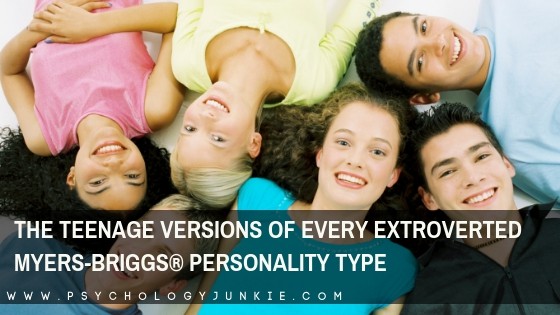The Most to Least Sentimental Myers-Briggs® Personality Types, Ranked
I’ve always considered myself a fairly sentimental person; I love looking at old photos of my kids when they were babies, I enjoy replaying good memories in my mind, and I certainly wouldn’t throw away an old love letter from my husband. But compared to some types I am practically a cold robot. I mean, I have thrown away old baby outfits or tossed movie ticket stubs without a hint of regret. Over the years I’ve noticed that my level of sentimentality is hardly as profound and nuanced as that of certain other personality types. I know an INFP who makes mix tapes based on different eras from her past, different relationships, feelings, challenges, successes. I know an ESFJ who creates scrapbooks filled with memories from her past and looks through them often, enjoying the journey into past experiences, loves, and losses.
What makes certain personality types more sentimental than others? What IS sentimentality? That’s what we’re exploring in today’s newest post! I hope you enjoy it!

First Off, What Does It Mean to be Sentimental?
According to the Cambridge Dictionary, “A sentimental person is strongly influenced by emotional feelings, especially about happy memories of past events or relationships with other people , rather than by careful thought and judgment based on facts.”
As an example, when I’m feeling sentimental, I often replay past memories in detail, getting swept up in the emotions and images that come to me as I’m replaying them. It can even feel like I’m right there, in a moment five or ten years ago, and during these moments I may wistfully long for certain things that make no sense rationally to want now at my current age.
Several years ago, I asked my social media followers and email subscribers to rate on a scale of 1-10 how sentimental they were. While I didn’t survey enough people to have a huge pool of responses, I got several hundred, and those combined with my own personal experiences as a Myers-Briggs practitioner, have led me to creating this post where I’m going to explore why certain types may be more sentimental than others. I hope you enjoy it!
Not sure what your personality type is? Take our new personality questionnaire here. Or you can take the official MBTI® here.
Table of contents
Estimated reading time: 15 minutes
The Most to Least Sentimental Myers-Briggs Personality Types
1. INFPs

When I surveyed my social media followers, INFPs ranked themselves as the most nostalgic of all the personality types, with many saying on a scale of 1-10 they’d be a “115” or “1000” when it came to sentimentality. Their dominant Introverted Feeling (Fi) tunes them into their values and emotions, while Introverted Sensing (Si) as their tertiary function draws them towards the comfort found in memories, past experiences, and nostalgia. One INFP I know says that she swims in and out of present, past, and future on such a regular basis that it’s easy to lose touch with where she is in the moment. When she’s immersed in her memories, she feels all the emotions just like she’s there again. I know quite a few INFPs who hold onto ticket stubs, special stones, or old emails and letters that give them a connection to an emotion or moment in time that they want to preserve.
Find out more about INFPs: All About the INFP Personality Type
2. ISFJs
Closely following are the ISFJs, for whom the past serves as a living, breathing companion. These individuals build their lives on the foundation of what has been, using their strong Introverted Sensing side to remember every detail of significant events and relationships with unparalleled clarity. Many ISFJs try to recreate special traditions, rituals, and routines that commemorate moments of significance from their past. And when it comes to decisions, these types look at their values, the emotional components, and the stories and lessons from the past they want to preserve more than the bare facts or logic. I know an ISFJ who commemorates people from his past by re-creating family recipes, re-watching old home videos of his childhood, or hosting family reunions on a regular basis. I know another ISFJ who, even though financially it would make sense, has decided to stay in his small town rather than venture into a big city because he is drawn to the stability and emotional connections he has to his town.
Discover more about ISFJs: Are ISFJs Rare? A Look at the Protector Personality Type
3. ESFJs
The warmth of shared history and the joy of mutual experiences define the ESFJ’s sentimentality. These types long for harmonious relationships, emotional richness, and a sense that the good memories from the past will be revisited again and again in the future. An ESFJ might plan reunions or anniversary celebrations, scrapbook, or create slideshow videos to revisit the past repeatedly along with all the emotions those memories entail. ESFJs are all about the emotional dynamics of the world they live in; they easily sense how people are feeling and want to live in alignment with their values even if it doesn’t always seem “logical” from a detached perspective.
4. ENFPs
With a heart as expansive as their imagination, ENFPs carry a unique brand of sentimentality. They love to explore new ideas and try new things, but they also feel deeply, and develop strong loyalties to people and places that are emotionally significant. They’re like adventurers collecting souvenirs of the soul, gathering moments that stir their hearts, always ready to reminisce about the journeys that have led them to where they are.
Find out more about ENFPs: 12 Amazing Fictional ENFP Characters
5. ISFPs
ISFPs are more focused on the present than their INFP type-siblings, but they still have a deep well of feeling and emotion that can give them a sentimental side. ISFPs are connected to the sights, sounds, tastes, and textures of the moment. They sift out meaning and emotional resonance from all their experiences, sometimes getting attached to objects, places, smells, and tastes that connect to an emotional experience. I know an ISFP who loves traveling to Disney World multiple times a year just so she can re-experience the rides she grew up with as a child. I know another ISFP who enjoys watching her favorite childhood sitcoms even now that she’s in her 50s. That said, ISFPs tend to be much more in touch with the present than the past, and are often less tied to past memories than people with Introverted Sensing (NP or SJ personality types).
6. INFJs
INFJs may not spend as much time rehashing the past as INFPs or ISFJs, but they still hold onto particularly impactful moments and enjoy focusing on the emotional world around them more than just the cold, hard facts of reality. Their Intuition conceives of a future where past and present connect, and where they can create rich, meaningful moments that will improve the world for others. For the INFJ, imagination, possibility, and harmony are the drivers more than sentiment over past memories. But there is still a rich emotional world that beckons to them on occasion, urging them to re-explore emotions and stories from their past that were especially profound or stirring.
Find out more about INFJs: How INFJs Process Emotions
7. ENFJs
ENFJs don’t have the past-revisiting nature of ESFJs, but they still live in a world rich with emotions, meaning, and values-based decision-making. They put their relationships front and center in their lives, and often make decisions based on how everyone will feel rather than looking at cold facts and logic for guidance. This doesn’t mean ENFJs don’t care about logic; they can be deeply analytical, but when push comes to shove, most ENFJs will put their values or the feelings of others before logic in priority. As Intuitive-Judgers, ENFJs are more interested in the future and the ripple-effects that they can create now to create the future result they want. The past is used as a key to those ripples; but the focus is typically on the future far more than past or present.
8. ISTJs
At first glance, ISTJs may not seem like the most sentimental types. They tend to look reserved, pragmatic, and orderly. But on the inside it’s a whole different story. ISTJs have an incredible memory for important details and work hard to preserve the past in tangible ways. Many ISTJs keep meticulous records, photos, or special objects that serve as reminders of events or people from their past. They also feel things more deeply than people realize; revisiting emotions, memories, and relationships in private, considering what they learned, what they could have done differently, or letting themselves feel the same emotions they felt long ago during a particularly meaningful moment. ISTJs cultivate a treasury of memories; they want to make sure that life is lived in line with their values, and the past helps guide them there.
Discover more about ISTJs: The Childhood Struggles of ISTJs
9. ESFPs
ESFPs are all about living in the moment and making the most out of each opportunity. They tend to not be as sentimental as other feeling personality types because their focus is always moving towards the present and revisiting the past can feel pointless to them many times. That said, ESFPs are still feeling types, and feeling in and of itself has a sentimental quality. Many ESFPs are deeply loyal to the places and people they have emotional memories associated with. They will go out of their way to consider people’s feelings or their own personal values when they make decisions, more so than looking at the detached logic of the situation. But there is a very go-getter, practical side to the ESFP that can make them appear very tough-minded and realistic when other Feeling types might get more swept away with their feelings. ESFPs and ESTPs are Extraverted Sensing types; they value reality, facts, and details that can be tangibly felt. ESFPs also have tertiary Extraverted Thinking, which they can tap into when they need to organize tasks and projects in an effective way. Because of this, ESFPs can quickly push aside sentimentality when they’ve got a job to do or when life presents a new opportunity.
10. ESTJs
ESTJs embody the quintessence of tradition and order, anchoring themselves firmly to the values and practices they believe foster structure and progress. While they might not openly indulge in sentimentality like some of the feeling types, they place a high value on history, legacy, and the lessons learned from past experiences. For an ESTJ, the past is not just a nostalgic reminiscence but a blueprint for future action—a repository of wisdom to be consulted and respected. Their approach to memories and traditions is pragmatic; they see the value in maintaining and honoring what has been proven to work over time. In their personal lives, this might manifest as a dedication to family traditions, a commitment to preserving cultural heritage, or a personal code of ethics that stands the test of time. While ESTJs are future-oriented, aiming to improve and systematize the world around them, their strategies are often grounded in a practical examination of what has been effective in their own personal history.
11. INTPs
INTPs, known for their logical and analytical minds, might seem at first to be distant from sentimentality. Online stereotypes abound with INTPs painted as robotic, socially awkward, and unfeeling. After all, they love rationality, logic, and reason. But that’s not all INTPs are focused on. They are humans and, yes, they do have feelings.
The INTP’s tertiary function, Introverted Sensing (Si), plays a significant but nuanced role in how they experience and value the past. While they are primarily driven by their dominant function, Introverted Thinking (Ti), which seeks logical consistency, and their auxiliary function, Extraverted Intuition (Ne), which thrives on exploring possibilities and what could be, Si gives them a connection to past experiences and a healthy dose of sentimentality. I know so many INTPs who rewatch old movies they loved as children, who like routines that keep them aligned with their past, or who are deeply sensitive and emotional when it comes to their spouses or children. INTPs might find themselves occasionally nostalgic, revisiting childhood pastimes or interests, or getting a hint of longing when they pass by a place they used to love. But when it comes to decisions, they can typically push aside sentimentality to focus on what they think is more logical, rational, and fact-based.
Find out more about INTPs: 12 Amazing INTP Anime Characters
12. ENTPs
ENTPs are all about innovation, debate, and exploring the world of possibilities. They are less interested in dwelling on the past thanks to their dominant function, Extraverted Intuition, which propels them towards exploring new ideas and potential futures. That said, ENTPs also have Introverted Sensing in their primary function stack. This means that ENTPs have moments of time where they can get fixated on past memories, feelings, emotions, and experiences that seem to pull them deeper and deeper into their web. Sometimes this is negative; some ENTPs may have stressful moments where all their past failures seem to come back to haunt them. For other ENTPs it can give them a brief respite; they can enjoy reminiscing about favorite memories or they may enjoy revisiting a place that gave them joy as a child. Many ENTPs enjoy specific routines and traditions that keep the past alive and well; but they never want these things to keep them from innovating, re-imagining, and creating something better.
13. INTJs
INTJs are known for their strategic minds, future orientation, and preference for logical over emotional decision-making. But, this doesn’t mean they are completely devoid of sentiment. We’ll not venture into the whole “INTJs are unfeeling robots” stereotype here.
The truth is, INTJs possess an introverted feeling function that, although not as obvious to outsiders as their thinking side, influences their inner world in profound ways. This function can give INTJs a deep sense of nostalgia for moments that had significant emotional impact. Whether it’s a major life achievement, a moment of deep personal insight, or an experience that shaped their perspective, INTJs can and do look back fondly on these memories. But their intuitive and thinking sides usually keep them firmly anchored in the future and focused on their goals. Their introverted intuition is constantly scanning the horizon for new possibilities and pathways, while their thinking side evaluates these options against their strategic plans and objectives. This balance allows INTJs to appreciate the past and the depth of their experiences without letting it cloud their judgment or divert them from their long-term ambitions.
Discover more about INTJs: 12 Stress-Busting Techniques for INTJs
14. ENTJs
ENTJs are the epitome of efficiency, leadership, and forward-thinking. They are not typically known for dwelling in the realm of sentimentality. For ENTJs, time is a precious resource, and they prefer to invest it in activities that propel them toward their goals. They view decision-making through a pragmatic lens, focusing on logic and strategic planning over emotional considerations. But ENTJs, like INTJs, aren’t cold robots who just want world domination and productivity at all costs. There are rare moments when even the most stoic ENTJ can be overwhelmed by these emotions, finding themselves unexpectedly reflecting on emotions, relationships, or simpler times from their past. These instances can be disconcerting to them, as they’re such a far cry from their usual objective and logic-driven mindset. But they may also find that tapping into their past emotions and experiences can bring a deeper level of understanding, empathy, and meaning. It can help to remind them that the decisions they make now can create positive memories and ripple-effects in the future.
15. ISTPs
ISTPs tend to focus more on the present moment than on reflections of the past. They prefer to live in the now, be open for whatever opportunity arises, and make rational, pragmatic decisions. But this doesn’t mean they lack a connection to their own history or traditions. They might not verbalize or openly express sentimentality the way other types might, but ISTPs do value experiences that have sharpened their skills or challenged their limits. They’re likely to revisit old projects, hobbies, or places not necessarily for the sake of nostalgia, but to assess their growth, apply new solutions, or simply to experience the thrill once more. ISTPs also have feelings and can develop powerful bonds with other people; so even though they prefer pragmatic decision-making, they can have moments where they are swayed by sentiment. This usually happens when they see someone else experiencing a strong emotional response, and it taps into their own inner feelings of loyalty and duty to those they care about.
16. ESTPs
ESTPs epitomize the essence of living in the moment and embody a rugged, action-oriented approach to life. Known for their dynamic energy and pragmatism, they thrive on immediate interactions and experiences, constantly seeking adventure and excitement. ESTPs have an innate ability to remain hyper-present, making the most out of every situation by reacting to it in real-time. This quality helps them to excel in crisis situations where quick thinking and adaptability are crucial. Unlike types that are more inclined to reflect on the past or strategize for the future, ESTPs are focused on the here and now, believing that the best response to life is one that is immediate and tangible. Their preference for action over rumination ensures that they rarely get stuck in the trap of what-ifs or regrets. I’m married to an ESTP and I quickly found that he can move past old regrets and disappointments and try to work on a new possibility or opportunity in the present. Rehashing past disappointments or experiences can feel like an exercise in futility to this type. That said, ESTPs can be very deeply feeling and caring when it comes to their families and loved ones and it’s not hard for them to consider the emotional needs of others in a decision. But they’ll usually try to sway people to the most logical or advantageous outcome if at all possible (they are amazing negotiators).
What Are Your Thoughts?
How sentimental do you feel like you are on a scale of 1-10? Do you relate to what I wrote here about your type or do you have a different opinion? I’d love to hear it! Let me and other readers know what you think in the comments!
Find out even more about your personality type in our eBooks, Discovering You: Unlocking the Power of Personality Type, The INFJ – Understanding the Mystic, The INTJ – Understanding the Strategist, and The INFP – Understanding the Dreamer. You can also connect with me via Facebook, Instagram, or Twitter!














My personality is between INTJ and INFJ. My friend who falls between ISTJ and INTJ told me that I’m sentimental, and I agree when it’s compared to him. He likes to throw out anything that’s not useful. My ISTJ mom is similar. I wouldn’t keep old ticket stubs, but I do keep all my old journals, all of the yearbooks & photos from my childhood including those of my classmates (friends, enemies, crushes, exes), many of my old school papers and clothing and toys. I like to do this because some of those things could be useful in the future (like saving clothing/toys for future children or grandchildren), and the other stuff (journals, photos, school papers) are like recording the history of my life, which I think is important to preserve.
Hi Susan,
As an INTJ child (way back in the 1960s) I loved three things in life (in this order). I loved to read. Just about anything. I was reading Dostoevsky (Crime and Punishment) as a junior in high school. And Alexander Solzhenitsyn who was all the rage back then.
I loved to fish. I had found a pond about a quarter mile from our house where I could spend long summer days in quiet solitude. As a ten and eleven year old I had devised some advanced fishing techniques that would have probably flummoxed many adult fisherman they were so innovative. And, finally, I loved to play pond hockey. I absolutely loved to ice skate! But when I was old enough to try out for our high school hockey team I absolutely hated the checking and violence of that very different game and at that point dropped hockey as a past time.
I believe the things that connect all my interests as a youth was I could engage in them alone, when I want to. I don’t have to wait for or depend upon others who I often perceive to be “flaky” inept, or just plain stupid. Who needs that!
I’m an INTJ,
I really value the memories and the relationships that I have with people (family , friends,etc.)or valuable moments in my life so, any pictures , memorabilia, or “tokens” to remind me of the past , I will keep. This has been a habit of mine since I was little, and it is hard for me to discard anything that holds a key to the past . Or serves a reminder of who I was or a memory made with someone (or group of people). My digital photo albums (including videos) on my phone and social hold intential and sincere moments in life that I don’t want to forget.
I’m surprised that my type is higher on this list because my MBTI type is a deep feeler on the inside then we may show on the outside.
An INTJ here. I have lacked sentamentality, throwing out more things from my past than I care to recount, except I will say I have a huge regret for throwing out a binder of drawings I did in my teenage years, as well as my old school booklet of Poems and stories from sixth grade where I received a high mark on every page (I also wrote a rather clever poem from the same grade, and threw it out, too; I just remember the first two lines). Toys of my children when they got older, I threw out, as well. My husband, an ENTJ, tells me I have regrets for getting rid of things, whereas he has none because he saved many items from his childhood. It is certainly a mixed bag of having a lack of sentimentality, but also living with regrets as I got older, missing all the things I didn’t save from my past.